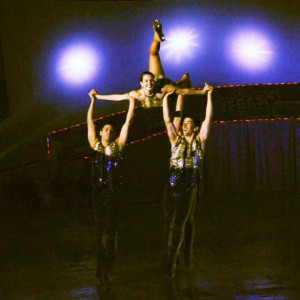 Philly PR Girl is kicking off a new monthly interview series featuring individuals living out unusually cool dream jobs. This month we chose to spotlight professional pair Figure Skater, Lauren Farr.
Philly PR Girl is kicking off a new monthly interview series featuring individuals living out unusually cool dream jobs. This month we chose to spotlight professional pair Figure Skater, Lauren Farr.
Lauren first started skating when she was just four years old in Idaho Falls, Idaho. At the age of 16, she decided to finish her high school education online, moving away to live with another skater’s family in Pennsylvania in order to begin training with Olympic coach Karl Kurtz. After years of hard work, practice and determination, Lauren and her pair partner placed within the Top 10 in the 2009 Junior Pairs U.S. Nationals Championship, and went on to compete in the U.S. National Championship.
Lauren stopped competitively figure skating when she was 20 years old, and for the past five years has traveled around the world to perform in figure skating shows as a professional pairs skater.
PPRG: When did you know you wanted to become a professional figure skater?
Lauren: After watching Oksana Baiul win the 1994 Winter Olympics, I was convinced a professional figure skater was what I wanted to be and was going to be when I “grew up.” Every day for a year, I begged my mom to take me to the rink to enroll in group classes and learn the basics of how to skate. Much to my mom’s surprise, not only did skating come completely naturally to me, but I had separated myself from the class and attempted to teach myself how to jump. After group classes, I was put in private lessons and haven’t stopped since!
PPRG: What is your role as a Professional Pair Skater?
Lauren: My role as a profession pair skater varies because each show entails different responsibilities. My pair partner and I often skated a solo performance in each show and understudied other pair skaters’ roles, in addition to skating in various group numbers throughout the show. As a pair, we are expected to skate and perform consistently at our best to our availability, which can be tough when some weeks we are skating an average of 8-12 shows a week (sometimes three shows in one day).
When skating Royal Caribbean cruise lines, we were not only required to perform shows but also to execute crew member side jobs. For example, we were taught how to be leaders for passenger boat drills, participate in parades and mob dances, spot lighting and dressing the dance show, and assisting with guest public skating sessions.
PPRG: Were there job opportunities you sought out in which you could take on additional roles or responsibilities?
Lauren: Yes, in addition to skating, I have also been a line captain during my two most recent show contracts. A line captain is not only responsible for his/her own skating, but also with assisting the show director on maintenance and involvement in the pre-production of the show. This also includes helping cast members learn the show choreography and correcting skaters’ mistakes.
PPRG: How long does a typical skating tour last?
Lauren: Show contracts can typically range anywhere from one month to one year. My longest tour was nine months, starting in the Netherlands and progressing through numerous cities in Germany and France. There are pros and cons to long contracts. Long contracts as great because you form special bonds with your cast and become a close-knit family. You experience ups and downs, holidays, and unforgettable moments while living, working, and travelling together. However, long contracts can also be exhausting. The nomadic life is not always “the glamorous life” when it comes to moving and packing a suitcase every week, to performing a countless number of shows from city to city.
PPRG: What was your favorite trip and why?
Lauren: France has been my favorite country to tour, which I’ve spent a total of approximately eight months touring. However, my most favorite contract was when I skated in the Dutch television show “Sterren Dansen op Het IJS” (Stars Dancing on Ice). It was amazing to do a show completely different from any of the other shows out there. The experience was both rewarding and challenging to teach a celebrity in Holland how to skate and perform a pair skating routine on live television. I made some great friendships and memories on that contract, as well as learned a lot as a performer!
PPRG: What do you love best about this job?
Lauren: This job has led me to such great happiness and fulfillment in my life. I feel there’s nothing I love to do more than travel and perform. Beyond that, I love the diversity of people and cultures that I am exposed to. With an international cast, you really get to experience and learn a lot about other cultures and customs that each cast member brings from their country. In general, I love the way we travel on tour – more often than not, the cast and I befriended a lot of locals who helped with finding the most authentic and popular spots in their city. I believe traveling is some of the greatest knowledge one can gain and experience in life. I’m so lucky to have had this skating opportunity because being a professional pair skater has given me stories of a lifetime. Without a doubt, these have been some of the best years of my life!
Special thanks to Lauren for chatting with us! To learn more about Lauren, follow her travels and performances behind-the-scenes on Instagram.










Such an interesting article.Skating is a very interesting sport which can bring some good sponsors to you.I am a skater myself for years.I have a friend who is skating with me for about 15 years,he is very professional.4 years ago he signed a contract with rollerblade.Since then he is enjoying life doing what he loves the most.
I love skating and i play him very prodessional four year.
I was a skater too a long time ago, but after I injured myself, I was forced to quit. This pics looks awesome!